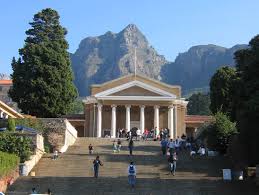The University of Cape Town’s Council is to decide today (30 March 2019) whether to endorse the Senate’s decision to approve a boycott of Israeli academic institutions. The decision came about due to a recommendation by the Academic Freedom Committee (AFC).
The issue has been driven by the Palestinian Students’ Forum, which supports Boycott Disinvestment Sanctions (BDS) – SA. BDS-SA is represented on the AFC, the Senate and has two board members on the Council.
The success of organisations like Boycott Disinvestment Sanctions (BDS) lies in distorting and manipulating facts, or just lying, in order to vilify Israel and gain sympathy for the Palestinians.
BDS professes to seek by peaceful means, the withdrawal of Israel from all the occupied territories. BDS’s fundamental goal, however, is to see Israel dismantled as a Jewish state. It also does not promote negotiations between Palestinians and Israelis. BDS holds that Israel alone must act.
When the Central Bottling Company announced its intention to buy Clover Dairies, BDS claimed that, in 2009, Central Bottling hosted a special reception to honour Israeli Brigadier-General Ben-Eliezer who served as Israeli Defence Minister and, in that capacity, presided over the 2002 storming of Jenin, a refugee camp, leaving hundreds of Palestinians dead’.
Let’s look at the actual facts. As described by Wikipedia, the Second Intifada was a violent campaign in the Israel/Palestinian conflict, which started in 2000. What made the Second Intifada different from anything that came before is the first time Hamas embarked on a campaign of suicide bombings in Israel.
In 2002 the Israeli Defence Forces (IDF) launched Operation Defensive Shield, a large-scale military operation; the largest military operation in the West Bank since the 1967 Six-Day War.
The stated goal of the operation was to stop terrorist attacks. The operation was mounted after the 27 March 2002 bombing during a Passover Seder (dinner) at the Park Hotel in Netanya. A Palestinian suicide bomber killed 30 mostly elderly holiday makers.
In April 2002, as part of Operation Defensive Shield, the IDF entered the town of Jenin. The IDF also entered other areas under the administration of the Palestinian Authority (PA).
Jenin was targeted after it was reported that it had ‘served as a launch site for numerous terrorist attacks against both Israeli civilians and Israeli towns and villages in the area’.
The IDF employed conventional military forces until an Israeli column walked into an ambush. From then on the IDF relied more on the use of armoured bulldozers to clear out booby traps laid in the camp
On 10 April then senior Palestinian official Saeb Erekat suggested to CNN that 500 Palestinians had been killed.
Four days after the fighting stopped on 11 April, PA Secretary Ahmed Abdel Rahman told UPI that the number was in the thousands and he hinted that Israel had snatched bodies, buried them in mass graves under the rubble of ruined buildings, and otherwise conducted activities on a scale compatible with genocide.
Claims of hundreds of civilians being killed in their homes as they were demolished, spread throughout international media.
The British media almost unanimously presented Jenin as a ‘massacre’ or at least an intentional ‘war crime’. Amnesty International (AI) and Human Rights Watch (HRW) repeated the ‘war crimes‘ accusations and demanded the appointment of an ‘independent investigative committee’. Le Monde on 16 April quoted HRW and the BBC (18 April) quoted AI, repeating the massacre allegations. Although AI apparently had no information, it issued a statement declaring: ‘The evidence compiled indicates that serious breaches of international human rights and humanitarian law were committed, including war crimes.’ AI also called for an ‘independent inquiry’.
Other influential NGOs published similar condemnations. On 3 May 2002, one month after the operation began, HRW launched a 50-page ‘investigative report’ entitled ‘Jenin: IDF Military Operations’. The Report was based primarily on unverifiable ‘eyewitness testimony’. Arguably, no credible analysis could have been produced in such a short time.
One sentence mentioned ‘mass terror’. The rest consisted of allegations that ‘IDF military attacks were indiscriminate … failing to make a distinction between combatants and civilians … and vastly disproportionate ….’
Subsequent official investigations found no evidence of a ‘massacre’. Official totals both from Palestinian and Israeli sources confirmed that between 52 and 54 Palestinians, mostly gunmen, and 23 IDF soldiers had been killed.
BDS dissembles by somehow linking its opposition to Israeli investment in South Africa to the non-existent ‘massacre’ in Jenin in 2002.
This is the organisation who has been the inspiration for what may become the official boycott of Israeli academia by the top university in the country.
Sara Gon is a Policy Fellow at the Institute of Race Relations (IRR) and editor of The Daily Friend

